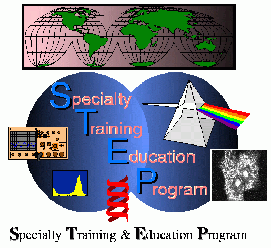 |
 |
 |
 |

[Introduction to STEP]
[Table of Contents]
[STEP HomePage]
[Search for Keyword]
Shriners Hospitals for Crippled Children Burns Institute 3229 Burnet Avenue and University of Cincinnati Medical School Dept. of Surgery, Transplantation Division 231 Bethesda Ave. Cincinnati, Ohio 45267-0558
1. Facilities: 400 square foot flow cytometry instrumentation facility, 1200 square foot biomedical research laboratory, 200 square feet of cell culture space, 400 square foot radionuclide laboratory, and core animal and histology/electron microscopy facilities.
2. Instrumentation:
Flow cytometry: Two flow cytometry instruments including a Coulter EPICS 753 equipped with 5-watt argon ion laser and a dye laser (rhodamine SG) pumped with a second 5-watt argon ion laser; and a Coulter XL equipped with an air-cooled argon ion laser. The EPICS 753 is equipped with a Cicero system which allows high speed sorting.
Other major instruments: Several microscopes including a Nikon photomicroscope with epi-fluorescence, spectrophotometer, 96-well plate reader, liquid and solid crystal scintillation counters, ultra centrifuge, high speed centrifuge with centrifugal elutriation rotor, and standard electrophoresis and PCR equipment.
Computers and analysis software: Flow cytometry data analysis systems are all IBM PC-compatible with the exception of the MDADS software. Software includes Coulter Easy 2 and XL, Phoenix Multicycle, Reproman, and Cyclops. A number of commercial non-cytometry programs are available for word processing, statistics, graphics, data presentation, and spread sheets.
3. Specialization Areas: Neutrophil cell functions including oxidative burst and phagocytosis. Analysis of neutrophil adhesion molecules and Fc receptors. The effects of trauma on neutrophil function and its relationship with sepsis. Effects of colony stimulating factors on neutrophils following traumatic injury. Patient immunophenotyping and mitogenic assays using cell-cycle analysis. Analysis of receptors on microorganisms, separation of developmental stages of Pneumocystis (trophs from cysts) using fluorescent liposomes and cell sorting. Northern blotting technology using the Sort-Blot technique.
4. Special Opportunities: Training is available in any area of expertise within the facility including both flow cytometry and immunology with a slant toward sepsis and organ transplantation. Possible areas of interest include leukocyte isolation and handling, functional assessments of leukocytes using flow and non-flow methods, immunophenotyping, neutrophil granule isolation and characterization, receptor analysis.
5. Special Courses Offered: None at this time.
6. Graduate Programs: Programs are offered in several areas with opportunities for using cytometric techniques. Depending upon the department either a Ph.D. or a Sc.D. can be obtained.
7. Local Accommodations: A local hotel is within walking distance with rooms for $80.00/night. A limited number of rooms are available for $10/night at a Guest House 2 blocks from the lab, owned by Shriners Burns Institute.
8. Transportation: The Greater Cincinnati-Northern Kentucky International Airport has direct flights to most major cities and several foreign countries and is less than 20 miles from the laboratory.
9. Cost of Internship: The cost depends upon what the individual wants to accomplish during the Internship. A base fee of $375/week covers most laboratory cost and flow cytometry instrument time. Reagents which are particularly expensive or not regularly used will raise the costs.
10. Communication:
George F. Babcock, Ph.D. University of Cincinnati Medical School Department of Surgery Transplantation Division 231 Bethesda Avenue Cincinnati, OH 45267-0558 Phone: (513) 872-6231 FAX: (513) 872-6999
 |
 |
 |
 |